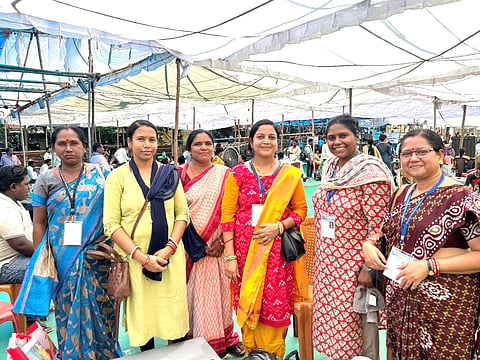A heatwave is raging during election season, but who will take responsibility of polling officers on duty?
India is currently at the peak of the Lok Sabha and Vidhan Sabha elections amidst an increasing heatwave. Odisha is particularly affected, frequently receiving red alerts due to the heatwave, which has already claimed several lives. Nevertheless, the elections must proceed.
The first phase in Odisha was scheduled for May 13, 2024, covering four districts: Berhampur, Kalahandi, Koraput and Nabrangpur. The Kalahandi district administration had planned ahead for election day, ensuring almost all government officers, including female personnel, were available for election duty.
Officers on election duty were trained to manage each polling booth. Each block was divided into various sectors, with 5-6 polling booths in each sector monitored by sector officers.
I was appointed as the presiding officer to manage a booth in Bhawanipatna. My team, consisting of five female polling officers and we went to the pink booth known as Sakhi Matdaan Kendra.
On the day of the dispersal of voting materials, we waited for 4-5 hours in the scorching heat to collect the items, including the electronic voting machines, control unit, ballot unit, posters and other documentation materials.
Standing in the heat for such long hours made some of us nearly suffer from heat stroke. I was surprised to see some elderly people with comorbidities assigned to election duty. The heat and the mental pressure of managing each polling booth severely affected some presiding officers. Some young women suffered from heat stroke, others developed spondylitis and many were severely exhausted due to heat stress.
The day before the voting was crucial, as the polling team had to arrange and organise the polling booth to ensure it was ready for voting day. On voting day, the team had to conduct a mock poll early in the morning between 5.30 am and 6.30 am to check the machines for errors. The voting time for electors was from 7 am to 5 pm.
As the voting began, there was a huge crowd moving into the polling booth. The elderly polling officers had to work under significant pressure in the heat to deliver error-free tasks. Each booth was monitored by a CCTV camera and was subject to constant visits from district administrative personnel.
Many polling and presiding officers, some of whom had undergone hip surgery or suffered from diabetes, high blood pressure and other health concerns, struggled the most during their duty.
The heat in Kalahandi claimed the lives of a few presiding officers on election day. One presiding officer in Kalahandi passed away due to cardiac arrest. Two more deaths occurred in Sambalpur district and one in Malkangiri district, reported Odia news outlet Sambad Digital.
Some officers lost consciousness due to the excessive heat and the mental pressure of facing suspension orders. Several presiding officers met with serious accidents while returning from duty early in the morning. Additionally, an elderly voter in the Nuapada district died after standing in a line for long hours in the heat.
The Election Commission of India should seriously consider these issues when assigning election duties during periods of extreme heat.
As we moved to close the voting, the total vote count at our polling booth was 642 out of total 1,140 registered voters, with 345 men and 297 women casting their ballots. I was surprised to see more elderly people voting than younger individuals.
The highest voter turnout was recorded in the tribal-majority Nabarangpur LS seat at 82.16 per cent, followed by Kalahandi (77.9 per cent), Koraput (77.53 per cent) and Berhampur (65.41 per cent).
The heatwave during the election was a challenge for many of us. The government officers, who were entirely responsible for each polling booth, experienced excessive heat stress and health problems. Who will take responsibility for their well-being?
Madhulika Sahoo is an anthropologist. She is currently working as an Assistant Professor at the Department of Anthropology, Kalahandi University
Views expressed are the author’s own and don’t necessarily reflect those of Down To Earth


